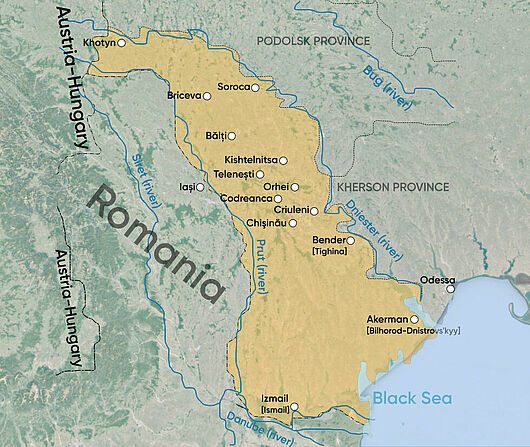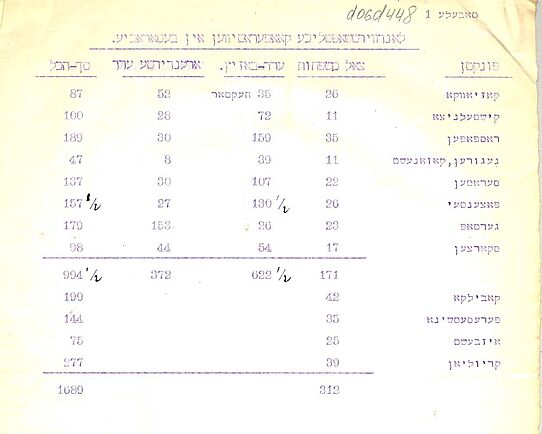Jewish Vineyards and Wine Making in Bessarabia
Bessarabia is a historical region in Eastern Europe, bounded by the Dniester river to the east, the Prut river to the west and the lower River Danube and Black Sea to the south. Following several border changes in the 19th and 20th centuries the area today lies within parts of Moldova and Ukraine.

Jewish farming in Bessarabia dates back to the early 19th century. The authorities initially encouraged the movement of Jews into agriculture. In 1839 just 3% of Bessarabian Jews were farmers, but by 1858 this grew to 12.5%. Bessarabia became a very important agricultural centre for the Russian Empire’s Jewish population.
By the late 19th century Bessarabian Jewish farmers became prominent in growing special crops such as vines, tobacco and orchard fruit. Around 600 Jews owned vineyards in Kishinev [Chisinau] and Orgeyev [Orhei] districts. These catered mainly to the Russian wine market, lacking in sufficient land suitable for wine cultivation.
Until the 1880s the Jews of Bessarabia enjoyed relatively good conditions. However, in the 1880s, due to a mix of growing antisemitism of the authorities under Tsars Alexander III and Nikolai II and a general economic depression in the Russian Empire, the situation worsened. Bessarabian Jewish farmers struggled and poverty among them had reached alarming levels. After the foundation of ORT in 1880, Jewish farmers in Bessarabia were among the early beneficiaries, receiving assistance to purchase seeds, tools and equipment.
Before World War I some three thousand Jewish families were engaged in growing tobacco in the region, and the area was still attracting Jewish farmers.
![Working in a field, [Telenesti ?], Bessarabia, Romania [now Moldova], 1920s-1930s. Archive Photograph](/fileadmin/_processed_/1/1/csm_psa0073_b4394eda64.jpg)
![ORT fruit-growing expert, Orhei [Orgeyev] Bessarabia [now Moldova], 1920s-1930s. Archive Photograph](/fileadmin/_processed_/9/c/csm_psa0235_f69704d3d3.jpg)
![Sifting grain, Alexandreni, Bessarabia, Romania [now Moldova], 1920s-1930s. Archive Photograph](/fileadmin/_processed_/e/2/csm_psa0782_917957966a.jpg)
ORT established a supply centre in Kishinev, where Jewish farmers and vintners could acquire, on credit, much of the machinery they needed. In many districts ORT provided machinery and small tools "on hire" and ORT agronomists and instructors regularly visited Jewish farms, giving advice and teaching new methods of agriculture, animal care, and related subjects.
After the war, in 1922, a substantial number (8,000-9,000) of Jewish families derived their living from agricultural pursuits with the assistance of ORT.
![Pressing grapes, Telenesti [Telenesht], Bessarabia, Romania [now Moldova], 1920s-30s. Archive Photograph](/fileadmin/_processed_/0/e/csm_psa0004_50303a3d45.jpg)
![Jewish farmers in vineyard, Criuleni, Bessarabia, Romania [now Moldova], 1920s-1930s. Archive Photograph](/fileadmin/_processed_/5/6/csm_psa0016_3914854536.jpg)
![Jewish wine makers, Codreanca [Kobylka], Bessarabia [now Moldova], 1920s-1930s. Archive Photograph](/fileadmin/_processed_/e/d/csm_psa0070_baf59bcc8d.jpg)
![ORT agronomist, Telenesti [Telenesht], Bessarabia, Romania [now Moldova], 1920s-1930s. Archive Photograph](/fileadmin/_processed_/f/3/csm_psa0072_af28824a96.jpg)
During the 1920s ORT helped farmers plant new vineyards and continued to support them with equipment and advice from agronomists.
For example, in 1927 ORT planted a vineyard on land owned by Yakov and David Leibl in Briceva [Bricheva], helping the family build their business. Another vineyard, owned by farmer Yehezkel Koifman, was set up with ORT’s help in Criuleni.


ORT supported vineyards existed in Briceva, Codreanca [Kobylka], Criuleni, Kishtelnitsa and Telenesti. ORT also trained Jewish youngsters from the orphanage in Chisinau in viticulture, ensuring they would have employable skills when they become independent.
The work supporting Jewish vine growers carried on in the 1930s. In 1938-39 ORT studied the state of Jewish agriculture in the region. ORT’s agronomist Mr H. Linker visited 358 Jewish families and conducted surveys on the economic situation of the farmers. As a result, ORT provided financial support to 132 families.
Report on agricultural cooperatives in Bessarabia for 1932-1934, March 1935.

![ORT tool-hire, Alexandreni, Bessarabia, Romania [now Moldova], 1920s-1930s. Archive Photograph](/fileadmin/_processed_/6/4/csm_psa0798_dade9d4f97.jpg)
![Pressing grapes, Telenesti [Telenesht], Bessarabia, Romania [now Moldova], 1920s-30s. Archive Photograph](/fileadmin/_processed_/1/4/csm_psa0821_9c99527d28.jpg)
![An ORT mower, Alexandreni, Bessarabia, Romania [now Moldova], 1920s-1930s. Archive Photograph](/fileadmin/_processed_/3/1/csm_psa0515_a10ca31ae2.jpg)
![Wine making in Telenesti [Telenesht], Bessarabia, Romania [now Moldova], 1920s-1930s. Archive photo](/fileadmin/_processed_/3/a/csm_psa0778e_4b872bb092.jpg)
![Farmer in a vineyard, Criuleni, Bessarabia, Romania [now Moldova], 1920s-1930s. Archive Photo](/fileadmin/_processed_/9/9/csm_psa0814e_cb4f650cda.jpg)
![Spraying vines in Chisinau [Kishinev], Bessarabia, Romania [now Moldova], 1920s-1930s. Archive Photograph](/fileadmin/_processed_/f/c/csm_psa0069_e647a42ad8.jpg)
![Workers tending grape vines, Kishtelnitsa, Bessarabia, Romania [now Moldova], 1930. Archive Photograph](/fileadmin/_processed_/5/6/csm_psa0589_3f4e43ee15.jpg)